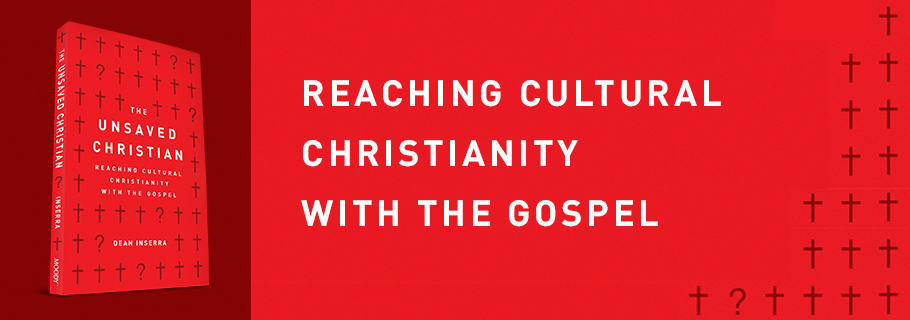This week the blog is sponsored by Moody Publishers and this post has been taken from The Unsaved Christian: Reaching Cultural Christianity with the Gospel by Dean Inserra.
I wrote the book The Unsaved Christian because I have experienced special challenges in reaching cultural Christians with the Good News of Jesus. Starting a gospel conversation with a Cultural Christian friend can be frustrating. Discovering a starting point will not make a conversation more comfortable, but it will allow clarity to develop concerning differences between a cultural religion and the actual Christian faith.
So where is one to begin in conversation?
Here are some tips to remember when establishing a starting point in a spiritual conversation with a Cultural Christian.
- Many Cultural Christians claim to revere the Bible. So feel free to refer to it as the authority on all things sooner than you might if talking to someone of another faith. You have a wide open door to use the Bible as your point of reasoning with people who already claim to believe it is a sacred text. Many of them have church affiliations that don’t use the Bible much, so it is likely that they have no idea what the Bible they claim to believe in actually says.
- Lovingly ask frustrating questions. “What is the standard for good?” “How good is good enough?” “How many more good deeds do you need to have than bad?” “Who actually doesn’t make it to heaven?” Ask these questions to uncover their source of authority for their stated beliefs. The reality is that most Cultural Christians won’t be able to answer these questions. The point of this is not to mock them or embarrass them with “gotcha” questions. It’s to establish a starting point of what God has told us about Himself, our sin, and the solution found in Jesus Christ.
- Ask about the Ten Commandments. There’s a good chance they can name some of them. Ask them how they’ve done in keeping them and if there is any consequence for breaking them. If not, why did God give them to us?
- Cultural Christians claim a belief in Jesus Christ. They also believe He died on the cross. If good people go to heaven, why did Jesus die? Is anything more confusing than a Savior dying for people who really didn’t need saving?
Many people I have baptized were former Cultural Christians who could not answer these types of questions. In their frustration, they began to realize something really was dissonant. The Christian faith they claimed to have held had little to do with anything the Bible said, outside of trying to be a good neighbor. Once their eyes were opened to the reality of God’s holiness and their personal sin, a need for a Savior was understood. A starting point was established and a need for the gospel believed.
Christians may be intimidated to start gospel conversations out of fear of not knowing the answers to every question or being ready to field every objection. But you may find that simply stating the gospel basics can be enough to turn on a light bulb in someone’s mind.
Remember that we’re looking for a starting point, not a one-stop-shop to full gospel understanding. Don’t enter these conversations as debates, but rather feel confident in simply expressing what the gospel is. Pray that God would provide the wisdom you need to then walk someone through their resulting questions.










